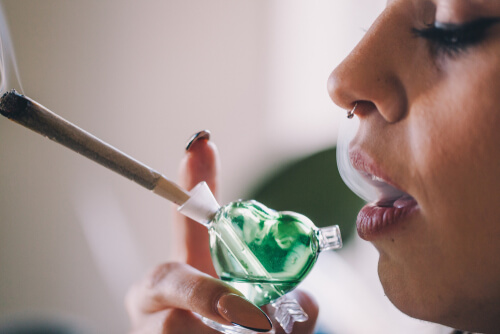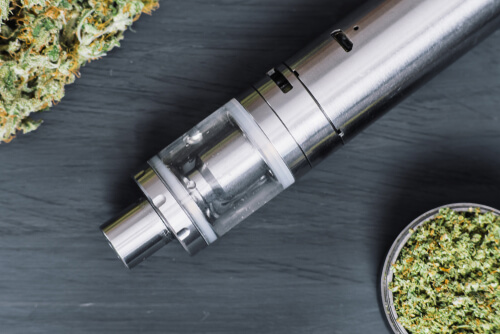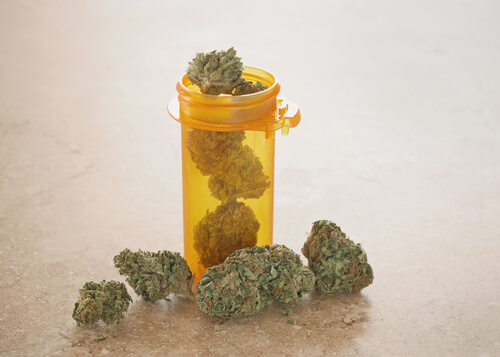
There’s an entire industry devoted to creating marijuana paraphernalia used by people who smoke it chronically, and a huge portion of it is advertised to teenagers.
Not all states recognize medical uses for marijuana; hence the use of drug paraphernalia is still of legal interest.
Drug paraphernalia is a term used on any item that can be used in connection with the possession and consumption of illegal drugs. Paraphernalia can be divided into two main groups – those that can be used to distribute drugs and those for ingestion. Almost all household items can be used as marijuana accessories.
Table of Contents
People can devise ways to smoke out of almost anything. Anything with burn marks or a smell of marijuana on it is possibly one of paraphernalia or marijuana smoking accessories. Listed below are some of the most common items used to smoke cannabis:
Marijuana Smoking Pipes, Bowls, Bongs, and Rigs
Here is the list of the cannabis accessories that will help to identify marijuana use.
Bong
A marijuana bong is a long tubular water pipe with a metal bowl attached on its one end. Teens commonly use marijuana bongs as drug paraphernalia by filling the tube with water and the bowl with the drug. They will light the bowl and breathe through the tube. Smoke is filtered by water before inhalation. This marijuana pipe is available in different colors and sizes.
Bowl
Marijuana bowls are somewhat the same as a Bong. It is a stem pipe with a metal bowl attached at the end. Marijuana is likewise packed at the bowl for smoking. This is yet another common way for teens to consume the drug. Chronic weed smokers almost always carry a marijuana bowl as paraphernalia anytime, anywhere.
Hookah
Marijuana pipes include Hookah. This is an ornate brass or a metal pipe with a rope-like inhalation tube. This originated from the Middle East. It functions like a Bong. This is very effective cannabis paraphernalia. Users can remove the tubes to disguise it as a lamp or a vase.
Bubbler
A bubbler is yet another popular marijuana tool. It is a combination of a pipe and a bong, but of a smaller size. This paraphernalia is more convenient to use and carry. This is a popular marijuana glass pipe.
Dab Rig
This paraphernalia is comparable to a bong used to smoke wax, oils, shatter, or hash out instead of plant materials. The end product is known as dab marijuana.
Papers, Spliffs & Blunts
Papers, spliffs, and blunts all make use of a rolled cigar as paraphernalia to smoke weed.
Rolling Papers
Rolling papers are commonly small, white, square pieces of papers packed in rectangular cardboard. They are as thin as a tissue paper. Users would roll loose marijuana pieces on them to create joints or cigarettes. These weed paraphernalia may also come in other sizes and shapes. Some even have flavors.
Blunt
A marijuana blunt can be easily made by replacing the tobacco with pot in a cigar for smoking. Dab weed smoking signs like residues of tobacco and the paper from the cigar are common among cannabis smokers.
Spliffs
These are joints wherein the pot is mixed using a loose tobacco leaf as paraphernalia.
Grinder
A marijuana grinder can be made of metal or wood that breaks up the drug flower and stems so it can be easily rolled into a joint, bowl, or blunt for smoking.
Vaporizers, Dabbing Tools, and Pens
Vaporizers
 Vaporizers come in many sizes. These portable paraphernalia are called marijuana pens. Some can take concentrates while others use the actual plant to heat and turn it into a vapor for inhalation.
Vaporizers come in many sizes. These portable paraphernalia are called marijuana pens. Some can take concentrates while others use the actual plant to heat and turn it into a vapor for inhalation.
Dabbing is one of the newest marijuana kits used to consume concentrates. It is the same as freebasing in other drugs. The user will have to heat the concentrate to turn it into vapor for easy inhalation. It produces a very potent concentrate, and one may suffer from long-term side effects of marijuana.
Vape pens
Vape pens are a smaller version of a vaporizer. This paraphernalia is available in several brands and types. Some users prefer these marijuana smoking devices because they do not give off a smell making it easier for them to consume drugs even in public places. They work almost the same as an e-cigarette for tobacco consumption. And since these are believed to be “healthier” because of the absence of smoke or combustion, though there is not a single medical marijuana research available to prove this, usage of these marijuana supplies is increasing.
Cannabis Clips
By smoking cannabis, THC, the active ingredient in weed, enters the blood immediately. How long does THC stay in your blood would depend on how often one smokes it. Most users smoke their joints down until they can no longer hold it using their bare hands. To avoid burns and to save the roaches or butts of the joints for later use, they use paper clips, roach clips, hair clips, and more as marijuana smoking accessories.
Tools to Store Marijuana
Plastic Bags
Resealable bags of different sizes are normally used as paraphernalia to distribute and store varying amounts of pot. One can find discarded bags with what look like weed seeds and stems. They can have brand names or stamp markings indicating how many grams of pot it holds. The sizes of these bags may range from a square inch to a sandwich-sized container.
Canisters
Instead of risking losing potency and some amounts to a ripped plastic bag, others prefer to keep the cannabis in safe paraphernalia like a black 35mm film canister.
Pill Bottles
Fully formed buds of weed and its strains can be safely stored inside an old pill bottle to maintain its size and shape.
Identifying Weed Paraphernalia
Knowing the other names for weed and finding drug paraphernalia provide evidence that drug abuse and possibly addiction is present. This is important for law enforcement teams and family members for the following reasons:
- Catching a cannabis user early is very important to avoid health problems and possible complications.
- Explain in full details the dangers of using weeds in a way that teens would easily understand.
- Early employment of substance abuse therapy models, if necessary.
- Better chance of achieving sobriety by recommending rehabilitation clinics for drug users.
- To get the latest abuse and addiction statistics of weeds for reference.
Page Sources
- Christian Giroud, Mariangela de Cesare, Aurélie Berthet, Vincent Varlet, Nicolas Concha-Lozano, Bernard Favrat, E-Cigarettes: A Review of New Trends in Cannabis Use, https://www.ncbi.nlm.nih.gov/pmc/articles/PMC4555324/
- Christian Lanz, Johan Mattsson, Umut Soydaner, Rudolf Brenneisen, Medicinal Cannabis: In Vitro Validation of Vaporizers for the Smoke-Free Inhalation of Cannabis, https://www.ncbi.nlm.nih.gov/pmc/articles/PMC4718604/
- Meghan E. Morean, Grace Kong, Deepa R. Camenga, Dana A. Cavallo, Suchitra Krishnan-Sarin, High School Students’ Use of Electronic Cigarettes to Vaporize Cannabis, https://www.ncbi.nlm.nih.gov/pmc/articles/PMC4586732/


 Reviewed by:
Reviewed by:  Written by:
Written by: 

 FindTreatment.gov
FindTreatment.gov